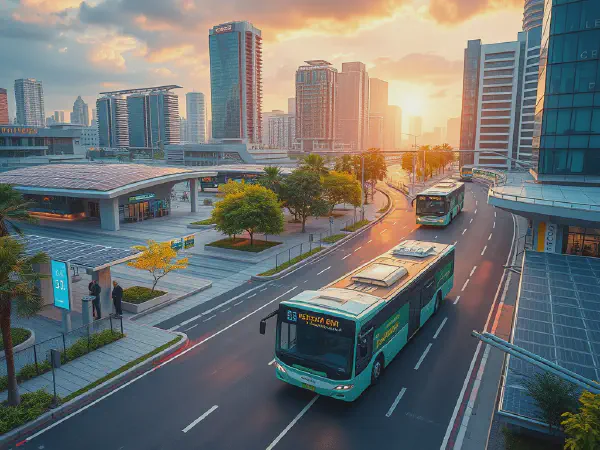The Future of Public Transportation: Electric Buses and Their Impact

The Future of Public Transportation: Electric Buses and Their Impact
The Future of Public Transportation: Electric buses have gained significant attention in recent years due to their potential to revolutionize the transportation industry and reduce greenhouse gas emissions. With advancements in battery technology and a growing focus on sustainability, electric buses are emerging as a viable alternative to traditional diesel-powered buses. In this article, we will explore the benefits of electric buses, the challenges of implementing them, and their potential to revolutionize the transportation industry.
Benefits of Electric Buses
Electric buses offer several benefits compared to traditional buses powered by diesel or natural gas.
Firstly, electric buses contribute to reduced greenhouse gas emissions. As they run solely on electricity, they do not emit harmful pollutants such as carbon dioxide, nitrogen oxides, and particulate matter. This reduction in emissions helps combat climate change and improve air quality in cities.
Secondly, electric buses improve air quality. By eliminating tailpipe emissions, they reduce pollution levels and the associated health risks for both passengers and pedestrians. This is particularly beneficial in densely populated areas with high levels of traffic congestion.
Benefits of Electric Buses
Another advantage of electric buses is their lower operating costs. Although the upfront cost of electric buses is higher compared to diesel buses, they have significantly lower fuel and maintenance costs. Electric buses require less maintenance due to their simpler drivetrains and have lower fuel costs as electricity is generally more affordable and stable in price compared to fossil fuels.
Furthermore, electric buses operate more quietly than their diesel counterparts. The absence of combustion engines and the use of electric motors result in less noise pollution, creating a quieter and more pleasant environment for passengers and residents along bus routes.
Lastly, electric buses are more energy-efficient. Through regenerative braking and efficient electric drivetrains, they can recover and reuse energy that is typically wasted in traditional buses. This improves overall energy efficiency and reduces the environmental impact of public transportation.
Challenges of Implementing Electric Buses
One of the main challenges of implementing electric buses is the high upfront costs. Electric buses require significant investment in infrastructure, including charging stations and battery storage facilities. Additionally, the initial cost of electric buses is usually higher than that of traditional buses, although the total cost of ownership over the lifetime of the vehicle is lower.
Limited charging infrastructure is another hurdle to widespread adoption. The establishment of a robust charging network is essential to support the charging needs of electric buses. Municipalities and public transportation authorities must invest in the installation of charging stations and ensure their accessibility and availability.
Range anxiety is another concern associated with electric buses. Although battery technology has improved, the limited range of electric buses compared to traditional buses poses a challenge. Extending the range and addressing range anxiety are critical for the widespread adoption of electric buses.
Battery technology limitations are another obstacle. Currently, the energy density and charging speed of batteries remain a limitation. Advancements in battery technology are needed to achieve longer ranges, faster charging times, and reduced costs.
Finally, training and maintenance pose challenges in transitioning to electric buses. Transportation agencies and maintenance personnel need to be trained in specialized knowledge and skills related to electric bus technology. Additionally, the availability of skilled technicians and adequate maintenance facilities is necessary for the efficient operation of electric buses.
Potential to Revolutionize the Transportation Industry
Electric buses have the potential to reduce dependence on fossil fuels and promote sustainable transportation. By eliminating the need for diesel or natural gas, electric buses can significantly reduce greenhouse gas emissions and contribute to a cleaner and healthier environment.
Furthermore, the integration of electric buses with renewable energy sources can further enhance their environmental benefits. Charging electric buses with renewable energy, such as solar or wind power, reduces their carbon footprint and supports the transition to a renewable energy future.
The smart grid integration of electric buses is another exciting prospect. Electric buses could serve as mobile energy storage units, enabling bidirectional energy flow between the grid and the buses. This can help balance electricity demand and supply, making the grid more resilient and efficient.
In terms of urban planning, electric buses can contribute to improved transportation infrastructure. As cities adopt electric buses, they may also develop charging and parking infrastructure that can be utilized by other electric vehicles, further promoting sustainable transportation options.
Finally, electric buses offer an enhanced passenger experience. Quieter operation, reduced vibrations, and improved air quality inside the bus contribute to a more comfortable and enjoyable ride for passengers. Additionally, the integration of modern technologies, such as Wi-Fi connectivity and USB charging ports, can further enhance the passenger experience.
